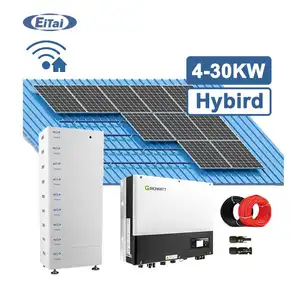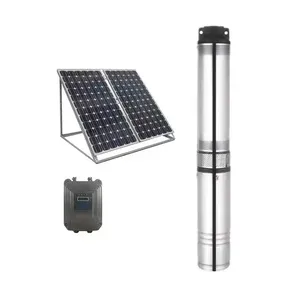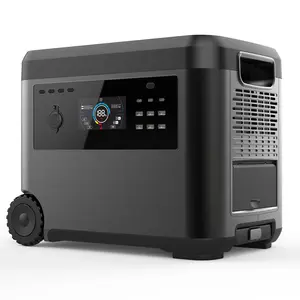Popular in your industry













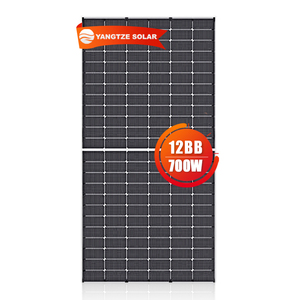

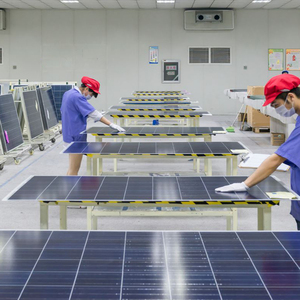

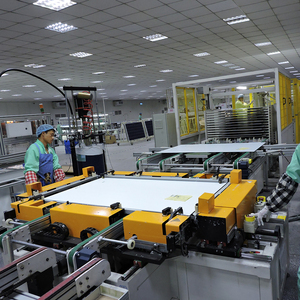
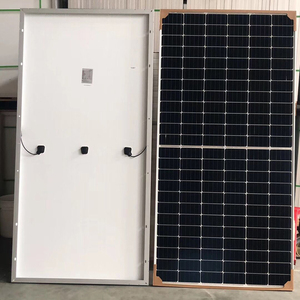









































































































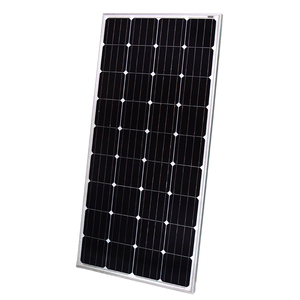



















































Top categories
About 36 volt solar panels
Understanding 36-Volt Solar Panels
Photovoltaic (PV) modules rated at 36 volts harness sunlight to produce electrical current, a process pivotal for their integration into specific systems and applications. These panels are a staple in residential, commercial, industrial, and agricultural settings due to their output voltage.
The underlying mechanism of these modules is the photovoltaic effect, whereby incident sunlight stimulates electrons within the panel, generating an electric current. This current is then utilized to power devices or charge batteries. Factors such as the panel's material composition, cell design, and external conditions like temperature and shading influence its voltage output.
Grasping the voltage specifications of solar panels is essential for those installing solar systems, as it informs the choice of inverters, wiring, and safety components necessary for optimal system performance. A broad spectrum of 36-volt solar panels is available, allowing for a tailored selection based on energy needs and design preferences.
Varieties of 36-Volt Solar Panels
The market presents a plethora of solar panels, each with distinct specifications and intended uses. Discerning these differences is key to choosing the right system.
-
Monocrystalline Silicon Solar Panels: Renowned for superior efficiency and longevity, these single-crystal silicon panels deliver a high power yield per area, ideal for space-constrained yet efficiency-seeking applications.
-
Polycrystalline Silicon Solar Panels: Comprising multiple silicon crystals, these panels offer a compromise between cost and efficiency, making them suitable for expansive installations where long-term cost benefits are prioritized.
-
Thin-Film Solar Panels: Their flexibility and light weight render them perfect for unconventional mounting scenarios, including uneven surfaces or settings where aesthetics are paramount.
Each panel type serves distinct scenarios, such as residential solar systems that demand a dependable electricity source. The selection hinges on space availability, budget constraints, and efficiency targets.
Selecting 36-Volt Solar Panels
In the business realm, choosing 36-volt solar panels necessitates a thorough evaluation of factors tailored to the intended application. The panel type is a pivotal decision; monocrystalline and polycrystalline variants cater to different preferences, with the former suiting efficiency-focused enterprises and the latter appealing to cost-conscious ones.
The panel's material is another crucial aspect, with durability and resistance to environmental wear influencing the decision. The intended application dictates whether thin-film or glass panels are more suitable.
The cell count within a panel also affects its performance and suitability, with a higher count indicating greater power but potentially larger size and weight, which could be restrictive in space-limited installations.
Other considerations include mounting methods (whether roof or ground), tilt angles (fixed or adjustable), and efficiency ratings, all of which shape the system's design and cost-effectiveness.
36-Volt Solar Panels on Alibaba.com
Alibaba.com emerges as a comprehensive marketplace, showcasing an extensive selection of solar panels for businesses worldwide. Its network bridges buyers with seasoned suppliers, simplifying the procurement of the precise solar panel type needed. Alibaba.com caters to a range of applications, from large-scale industrial to smaller residential projects.
On Alibaba.com, businesses seeking 36-volt solar panels benefit from customizable search results, filterable by application, material, cell count, and more. This streamlined approach enables buyers to pinpoint suitable products swiftly, bypassing less relevant listings.
Alibaba.com's dedication to secure transactions, exemplified by services like Trade Assurance, guarantees purchase protection until delivery fulfillment. Opting for Alibaba.com as a sourcing platform empowers businesses to broaden their operations and embrace renewable energy solutions with confidence.
Frequently Asked Questions About 36-Volt Solar Panels
What considerations are key when selecting a solar panel for a solar energy system?
Key considerations when choosing a solar panel include the material, which influences durability and efficiency; cell count, affecting power output; conversion efficiency; and the panel's size to ensure compatibility with the installation site.
How do solar panel types fare in efficiency comparisons?
Monocrystalline silicon solar panels generally surpass other types, like polycrystalline or thin-film, in efficiency due to their superior sunlight-to-electricity conversion capability.
Is solar panel operation feasible on overcast days or in shaded areas?
Even in diffuse light or partial shade, solar panels can produce electricity, albeit at reduced efficiency, which varies with the shading degree and panel quality.
What distinguishes monocrystalline from polycrystalline solar panels?
Monocrystalline panels, composed of a single silicon crystal, typically offer greater efficiency and durability but at a higher cost compared to polycrystalline panels, which consist of several smaller crystals and provide a more economical option with marginally lower efficiency.
What maintenance do solar panels require?
Solar panels demand minimal upkeep, such as regular cleaning for peak efficiency and inspections for physical damage or debris accumulation.
What is the expected lifespan of solar panels?
Designed for longevity, solar panels often come with warranties spanning 10 to 25 years, and their lifespan can be extended with proper installation and maintenance.
How durable are solar panels in marine environments?
In marine settings, the durability of solar panels hinges on their build quality and maintenance, with high-grade marine panels enduring several years with appropriate care.
Can solar panels integrate with existing electrical systems or designs?
Solar panels can be incorporated into existing electrical frameworks or designs, provided compatibility is verified. Professional consultation is recommended to ensure safety and efficiency.
What environmental impact do solar panels have?
As a clean energy source, solar panels produce no emissions during electricity generation, thereby reducing fossil fuel dependence and contributing to lower greenhouse gas emissions.
How does temperature influence solar panel performance?
Typically, solar panel efficiency declines with rising temperatures, prompting the integration of cooling systems or heat dissipation methods in larger installations to sustain high efficiency.
Is it feasible to expand a solar energy system as business needs grow?
Many solar energy systems are designed to be scalable, allowing for the addition of more panels to accommodate growing business demands. Professional guidance is advisable for assessing current needs and planning for expansion.

